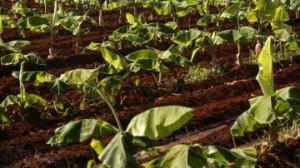The Globe and Mail | Wednesday, Apr. 08, 2009
Countries short of productive agricultural land but rich in capital are acquiring farmland in other countries, most of them poor. In many cases, the food grown on the farms is effectively removed from the world market and exported back to the country that did the deal.
Eric Reguly
If July's Group of Eight summit in Italy is looking for an issue beyond the recession, offshore farms is it. Denounced by some as neocolonialism or land grabs, praised by others as delivering investment to poor countries, this form of food outsourcing is in sore need of an international code of conduct, all the more so since it is spreading rapidly and is bound to involve Canada at some point.
International farm investment, to use its blandest description, has become a phenomenon in recent years and new reports about its "risks and opportunities," to use an even blander United Nations description, are filling agricultural and rural-development watchdog websites.
The concept is simple. Countries short of productive agricultural land but rich in capital are acquiring farmland in countries, most of them poor, with land to spare, or allegedly so. In many cases, the food grown on the farms is effectively removed from the world market and exported back to the country that did the deal. Not surprisingly, China and OPEC's Middle East members, which have more oil than irrigation water, are the most prolific deal makers and Africa is their juiciest target.
A fresh report commissioned by the UN Food and Agriculture Organization says that 2.5 million hectares, an area almost the size of Belgium, has been acquired since 2004 in five African countries alone.
A recent report from the International Food Policy Research Institute (IFPRI) in Washington says between 15 million and 20 million hectares of farmland in poor countries has been snapped up by foreigners since 2006. The land, it says, is worth as much as $30-billion (U.S.). Offshore farms are a big, global business.
As far as anyone can tell, China pioneered the offshore farm game about 10 years ago, when it leased land for food production in Mexico and Cuba. The acquisition pace has quickened in recent years because of rising commodity prices, culminating in the "food crisis" of 2007 and 2008, when mass starvation seemed a real possibility.
While the oil price collapse and the record production of some crops have since downgraded the crisis, China, Saudi Arabia, Kuwait, Qatar, India, South Korea and other countries short of farmland are taking the long-term view. They have burgeoning populations, are short of water and realize food prices could resume their upward trajectory at any time. So they are preparing for the worst and snapping up land wherever they can find it.
There is no set formula for the acquisitions. Some are purchases, others leases. Some land is acquired by sovereign wealth funds, some by private investors, among them Morgan Stanley, which acquired a vast spread in Ukraine in March. Few of the deals are transparent; some are truly strange. Recently a former investment banker named Philippe Heilberg, now chairman of Jarch Capital, gained leasehold rights to some 400,000 hectares in Sudan by taking a majority stake in a firm controlled by a former warlord who fought on both sides of Sudan's civil war.
An increasing number of land deals are facing local resistance. In Madagascar, Daewoo Logistic's effort to lease 1.3 million hectares - fully half of the arable land - to produce maize and palm oils contributed to the turmoil that overthrew the government earlier this year. The Daewoo deal was scrapped.
The UN and the watchdogs have valid concerns. The UN published a report in May called "Land Grab or Development Opportunity?" which had a lengthy list of concerns. It said some of the deals lack transparency, which "creates a breeding ground for corruption." Many countries lack the legal systems to protect local rights - farmers may get thrown off land they can't prove they own. Environmental issues, such as high water use of new crops planted by absentee owners, can often be ignored. The big question, of course, is: Where does the production go if the host country develops a food shortage? Sudan, bizarrely, has welcomed farmland seekers- the same country that relies on the UN's World Food Program to feed millions of its people.
To be sure, some deals can benefit both sides. If jobs are created, if better technology boosts yields, if roads and irrigation are built to help the entire local community and if some food is left on the local table, life can be pleasant. The problem is that it's hard to tell whether deals struck now are abusive or will benefit the host country as well as the investor. This is why oversight is needed, and why guidelines have to be drawn up.
To its credit, Japan, which is playing the farmland game too, has suggested the July G8 summit be used to draw up a code of conduct for foreign farmland deals. It would be in Canada's best interests to support such an initiative. Canada has vast amounts of arable land, ready equipped with water. The land is incredibly cheap by global standards. Foreign investors have tried to buy prairie farmland, but have been stopped by foreign ownership rules. But, in time, Canada may not be able to resist the demands from overseas investors. Best to have guidelines in place before the For Sale signs go up in Manitoba and Saskatchewan.












